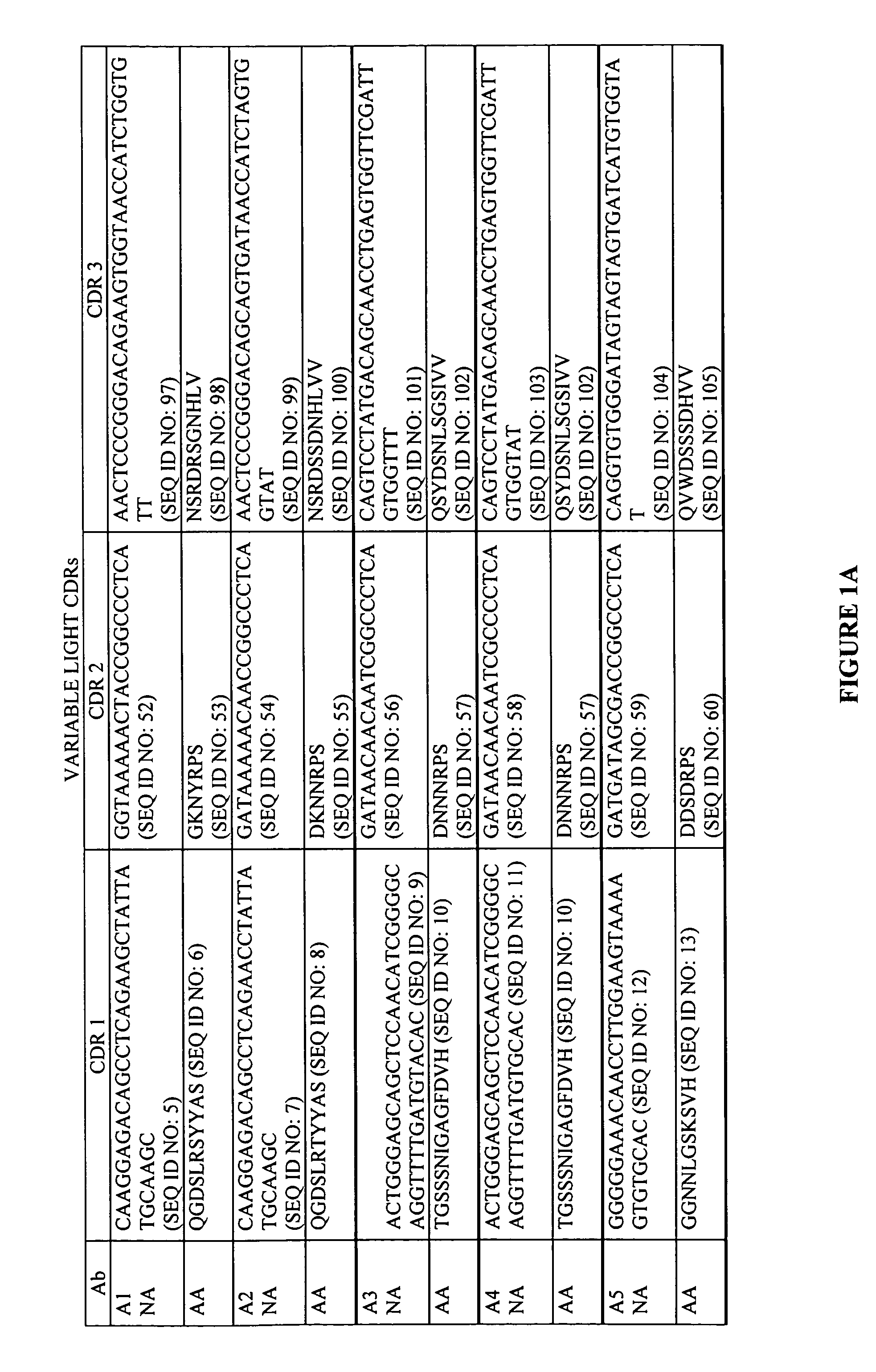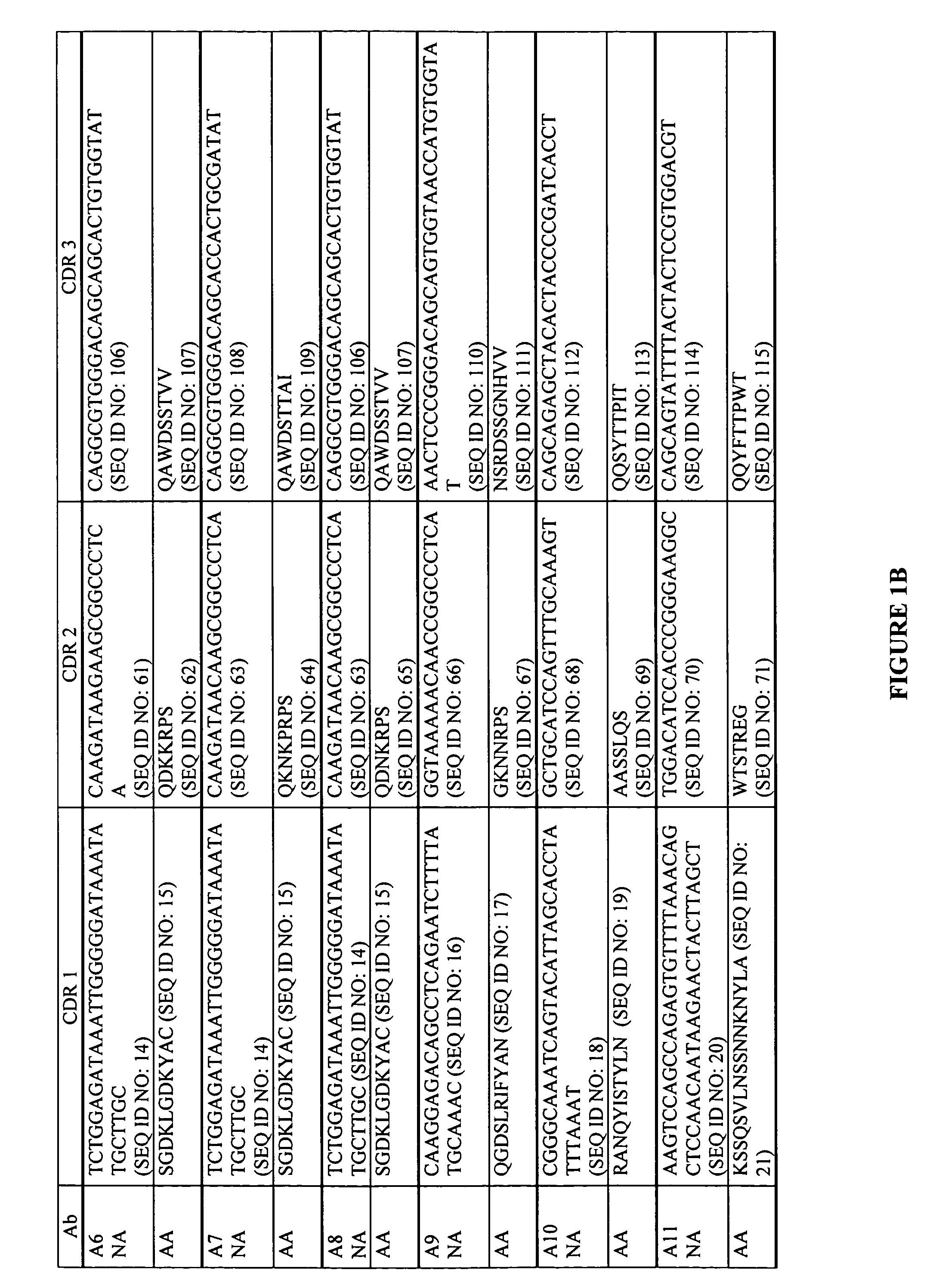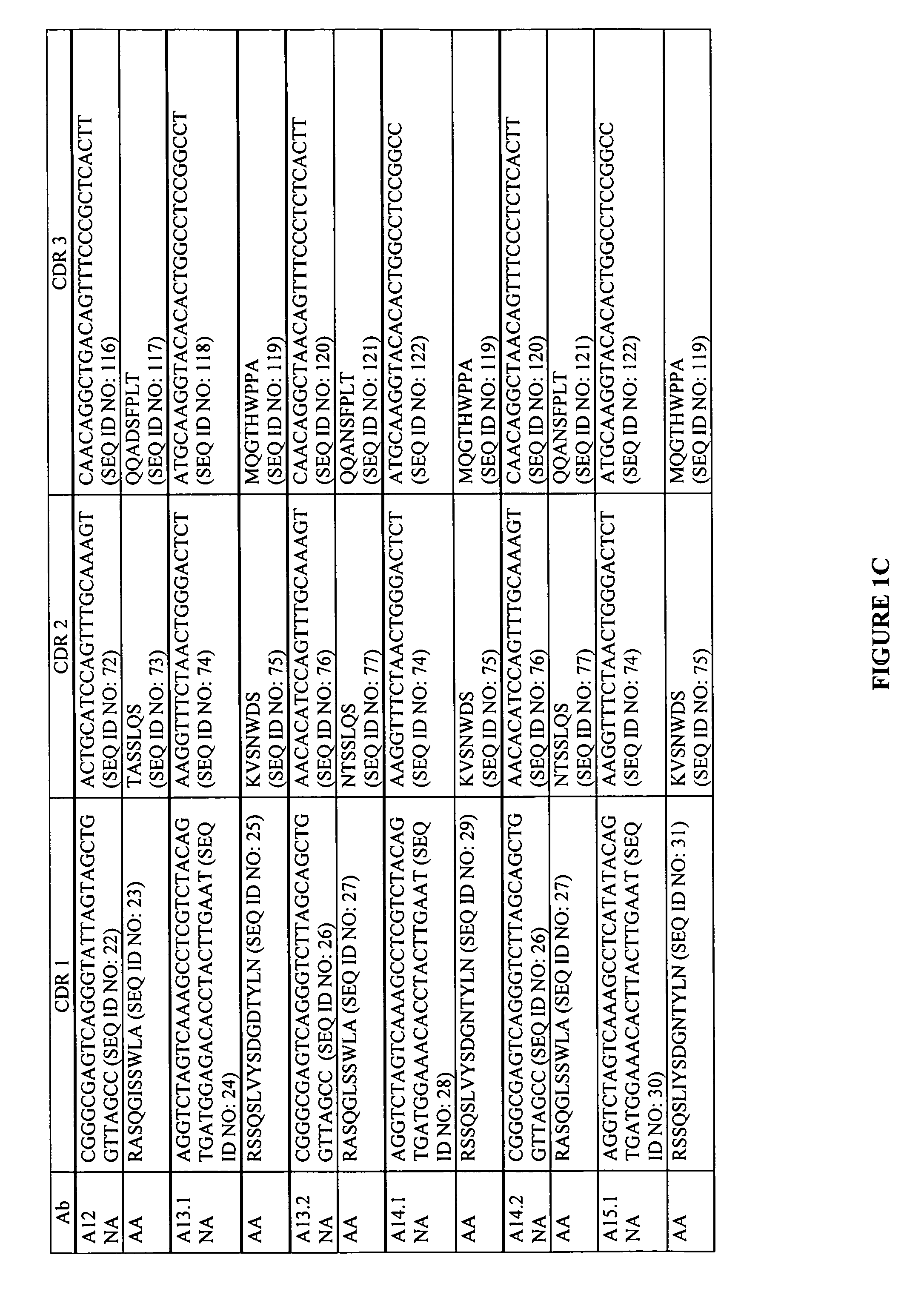Antigen binding proteins capable of binding thymic stromal lymphopoietin
a technology of thymic stromal lymphopoietin and antigen binding protein, which is applied in the direction of fused cells, drug compositions, immunological disorders, etc., can solve the problems that anti-inflammatory therapies are not always effective in reducing or preventing fibrosis
- Summary
- Abstract
- Description
- Claims
- Application Information
AI Technical Summary
Benefits of technology
Problems solved by technology
Method used
Image
Examples
example 1
Preparation of Antigen
[0214]Several forms of recombinant TSLP were used as immunogens. Human TSLP was expressed both in E. coli and in mammalian cells. The E. coli produced human TSLP was an untagged full-length protein. TSLP protein was produced in COS PKB cells having a deleted furin cleavage site produced by deleting nucleotides 382-396 (AGAAAAAGGAAAGTC, SEQ ID NO: 370) corresponding to amino acids 128-132 (RKRKV, SEQ ID NO: 371). This protein contained a C terminal polyHIS-Flag tag (Nucleotide sequence=ATGTTCCCTTTTGCCTTACTATATGTTCTGTCAGTTTCTTTCAGGAAAATCTTCATCTTACA ACTTGTAGGGCTGGTGTTAACTTACGACTTCACTAACTGTGACTTTGAGAAGATTAAAGC AGCCTATCTCAGTACTATTTCTAAAGACCTGATTACATATATGAGTGGGACCAAAAGTAC CGAGTTCAACAACACCGTCTCTTGTAGCAATCGGCCACATTGCCTTACTGAAATCCAGAG CCTAACCTTCAATCCCACCGCCGGCTGCGCGTCGCTCGCCAAAGAAATGTTCGCCATGAA AACTAAGGCTGCCTTAGCTATCTGGTGCCCAGGCTATTCGGAAACTCAGATAAATGCTAC TCAGGCAATGAAGAAGAGGACAACCAATAAATGTCTGGAACAAGTGTCACAATTACAAG GATTGTGGCGTCGCTTCAATCGACCTTTACTGAAACAACAGCATCACCATCACCATC...
example 2
Mouse Anti-Human TSLP Antibodies
[0218]hTSLP-Fc was used for immunization of Balb / c mice (Jackson Laboratories, Bar Harbor, Me.). After several rounds of immunization, lymphocytes were released from the spleen and were fused with mouse myeloma cells, NS1 (ATCC) by chemical fusion with 50% PEG / DMSO (Sigma). The fused cells were seeded in 96-well plates at the density of 2×104 cells / well in 200 ul of DMEM HAT (0.1 mM hypoxanthine, 0.16 mM thymidine, 4 mM aminopterin, Sigma) media supplemented with 10% FBS, 5% Origen Cloning Factor (BioVeris™), 1× Penicillin-Streptomycin-Glutamine, Sodium Pyruvate (Invitrogen). Medium was replaced 7 days post-fusion with DMEM HT (0.1mM hypoxanthine, 0.16 mM thymidine) media supplemented with 10% FBS, 5% Origen Cloning Factor (BioVeris™), 1× Penicillin-Streptomycin-Glutamine, Sodium Pyruvate (Invitrogen). Conditioned media was collected two days after medium change and preceded for primary screening.
example 3
Fully Human Antibody Generation
[0219]Fully human monoclonal antibodies specific for TSLP were generated using the XenoMouse® technology according to protocols described, for example, in U.S. 2005 / 0118643, U.S. Pat. Nos. 6,114,598, 6,162,963, 7,049,426, 7,064,244, Green et al., Nature Genetics 7:13-21 (1994), Medez et al. Nature Genetics 15:146-156 (1997), Green and Jakobovitis J. Ex. Med. 188:483-495 (1998) (all of which are incorporated by reference herein), and as described below.
[0220]Two campaigns were conducted. In campaign 1, IgG2 and IgG4 cohorts of XenoMouse® were utilized. 50% of the mice received E. coli produced human TSLP and 50% received mammalian produced human TSLP (described above). Serum titers were monitored by ELISA (described below) and mice with the best titers were fused to generate hybridomas using the following protocols.
[0221]Selected mice were sacrificed and the draining lymph nodes harvested and pooled from each cohort. The lymphoid cells were enriched for...
PUM
| Property | Measurement | Unit |
|---|---|---|
| temperature | aaaaa | aaaaa |
| pH | aaaaa | aaaaa |
| temperature | aaaaa | aaaaa |
Abstract
Description
Claims
Application Information
 Login to View More
Login to View More - R&D
- Intellectual Property
- Life Sciences
- Materials
- Tech Scout
- Unparalleled Data Quality
- Higher Quality Content
- 60% Fewer Hallucinations
Browse by: Latest US Patents, China's latest patents, Technical Efficacy Thesaurus, Application Domain, Technology Topic, Popular Technical Reports.
© 2025 PatSnap. All rights reserved.Legal|Privacy policy|Modern Slavery Act Transparency Statement|Sitemap|About US| Contact US: help@patsnap.com



